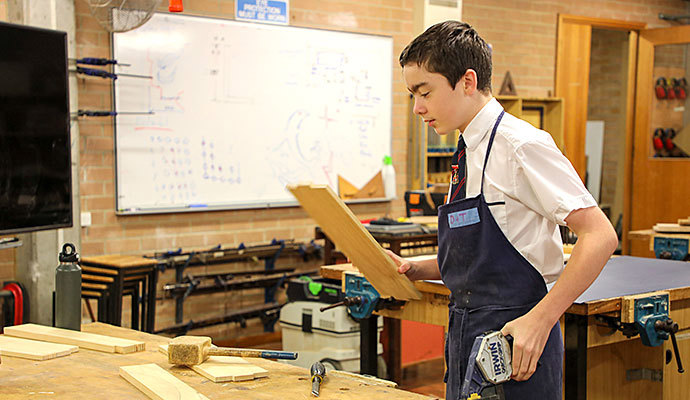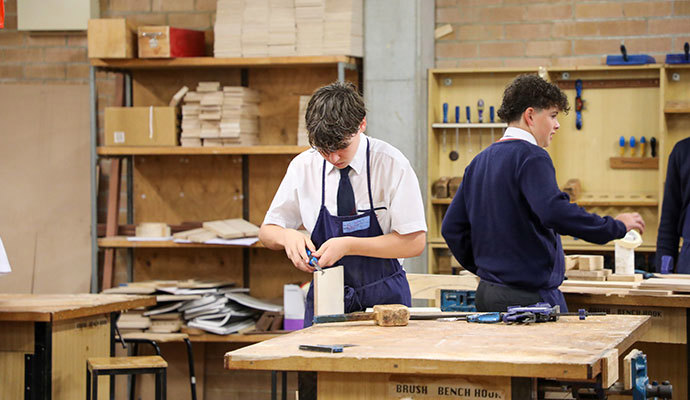The study of Industrial Technology – Timber, Core 1 Module in Year 9 and Core 2 Module in Year 10 provide students with opportunities to engage in a diverse range of creative and practical experiences using a variety of technologies widely available within the Timber Industry.
Students who have not completed Industrial Technology - Timber 1 in Year 9 can still choose this course in Year 10 and adjustments to the projects they make can be made.
The course seeks to develop in students an understanding of the interrelationships between technology, the individual, society and the environment, and to develop their ability to think creatively to produce solutions to practical problems.
- The majority of student time is spent making timber projects
- Theoretical concepts and skill development are integrated into practical projects. Students learn from doing.
- Students are also required to produce a folio documenting the processes they use and apply Computer Aided Design to represent ideas and communicate effectively.
The study of Industrial Technology Timber in the Preliminary Course serves as a platform for building understanding and skills for the HSC. Much of Australia’s economic, social and cultural development can be related to the capacity of our industries to develop and use technology in the manufacture of goods and services. The effective and responsible application of industrial technologies has a direct bearing upon the quality of our lives. For this reason, the study of industrial technology and its role in industry is relevant and purposeful.
Contact
Head of Department: Emily Nightingale
Email: enightingale@barker.nsw.edu.au


Year 9
Industrial Technology - Timber 1
Students develop an understanding of the following:
• Safe Work Practices
• Properties and characteristics of timber
• Production and conversion of timber products
• Modifying design using the principles and elements of design
• The impact of technology on society and the environment
Students develop skills in the following areas:
• Communication techniques – including drawing and Computer Aided Design
• Measuring and Marking Out
• The use of hand and machine tools
• Preparation, Cutting, Shaping, Joining and Finishing techniques for timber projects
• Turning between centres on the lathe
• Project management and report writing.
Assessment
Task 1: Research Assignment
Task 2: Timber Project 1
Task 3: Timber Project 2
Year 10
Industrial Technology - Timber 2
Students develop an understanding of the following:
• Hardwood and Softwood Timbers
• Manufactured Boards and Natural Timbers
• Modifying design to improve function and aesthetics
• How to select appropriate timber
• How to create cutting lists and costings
• The impact of technology on society and the environment
• Commercial processes compared to classroom practices – including sustainable practices.
Students develop skills in the following areas:
• Project Management
• Risk Assessment and management.
• Communication techniques – including drawing and Computer Aided Design
• The safe use of hand and machine tools, jigs and templates
• Preparation, Cutting, Shaping, Joining and Finishing timber projects
• Report writing
Assessment
Task 1: Research Assignment
Task 2: Timber Product
Task 3: Furniture Project
Task 4: Semester 2 Examination
Year 11
The course seeks to raise students’ awareness of the interaction between technology, industry, society and the environment, and to develop their ability to make value judgements about issues, decisions and problems arising from this interaction. Students will visit at least two different companies within the Timber Industry and complete an Industry study on the management and operation of these organisations. In the HSC course, students are required to complete a Major Project and Folio which comprises 60% of their external assessment mark.
• The majority of student time is spent making timber projects
• Theoretical concepts and skill development are integrated into practical projects. Students learn from doing.
• Students are also required to produce a folio documenting the processes they use and apply Computer Aided Design to represent ideas and communicate effectively.
Students develop an understanding of the following:
• How a business is organised and managed – Excursions to Art of Kitchen and Toscano Guitars
• How to choose appropriate processes and techniques to produce quality projects
• Safe work procedures and assessing risk
• The properties and characteristics of timber
• The impact of timber industries on society and the environment
• The impact of new, existing and emerging technologies.
Students develop skills in the following areas:
• How to manage a project
• How to write a report
• How to select and apply appropriate research and problem-solving skills
• How to use a wide range of equipment with an increased emphasis on the use of jigs, templates and machines to produce projects efficiently in a proficient manner.
• How to communicate effectively using graphical methods and Computer Aided Design
• How to Prepare timber, Mark out, Cut, Shape, Assemble and apply Finishing Techniques to produce Quality timber projects
Assessment
Task 1: Industry Case Study and Skill Development Projects
Task 2: Bespoke Mini Major Project
Task 3: Semester 2 Examination

